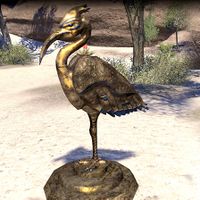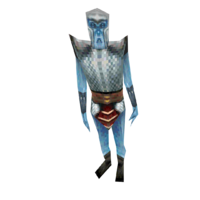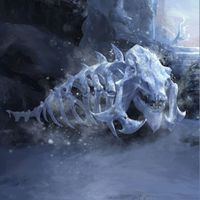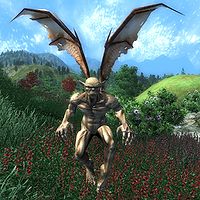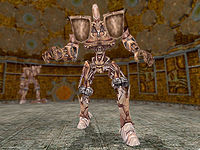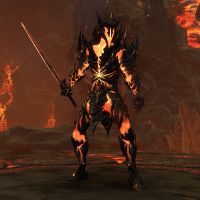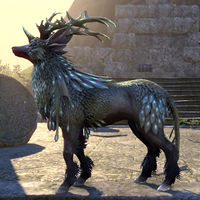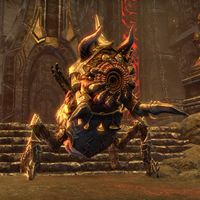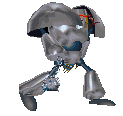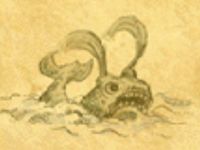Lore:Bestiary I
Ibis[edit]
An Ibis is a heron-like bird with a long, curving beak. In Yokudan theology, they were considered sacred and oft associated with Tu'whacca, the God of Souls. His veneration is best illustrated in tombs and burial places, where Tu'whacca is represented in statuary and reliefs as a figure with the head of an ibis and the body of a man. These resting places are also sometimes replete with numerous funerary statues that that depict a winged ibis-lion creature, such as the Al-Danobia tomb in Hammerfell. Tu'whacca was once considered the patron of mages, and some Ra Gada spellcasters tipped their staves with finials in the shape of Tu'whacca's sacred ibis.
- See also: Curlew
Ice Golem[edit]
Ice Golems are a typically weak variety of Golem, created out of ice.[1] These magically enchanted creatures do not only cause injury with their vicious physcial attacks, but also from the extreme cold aura they generate. They are immune to cold based spells, which do nothing but heal the constructs.[2] They naturally have a weakness to fire. Some Ice Golems are known as Ice Atronachs or Water Atronachs.[3][4][5][6] They are not to be confused with the Elemental Daedra, Frost Atronachs, which are also sometimes known by these names.[7]
Three powerful ice golems, known as Glacial Guardians,[8] were used by anicent mer to keep the Sea Sload sorceress Z'baza imprisoned in Coral Aerie.[9][10]
Ice Tribes[edit]
The Ice Tribes (also referred to as glacier tribes) are blue-skinned, tribal humanoids known to be encountered in the northern, frozen regions of Tamriel. Their physiques are typically quite muscular and some can be seen with two blue spike formations upon their shoulders. They are known to make allies with creatures like trolls, flying rays, and the fearsome Gehenoth. They are also capable of negotiations and making deals with men.
Ice Wraith[edit]
The Ice Wraith is a magical, lucid serpentine nature spirit purely made out of ice. They are typically found across Skyrim's snow-blown landscape and mountain ranges but can also be found in High Rock and Cyrodiil's reclusive mountain country, as well as the Sea of Ghosts. They blend in the snow and become nigh invisible to the naked eye. They will then lunge at unsuspecting prey with their entire body and bite them to death. Prey can sometimes get infected with Witbane, a disease that dulls a person's intelligence. Ice Wraiths are among many creatures that are immune to paralysis.
Ilyadi[edit]
Ilyadi (or Illyadi)[11] are a type of Faerie that once inhabited the Summerset Isles. They are described as many-eyed forest giants taller than the trees, with eyes that cover their heads.[12][13] They attacked the early Aldmer, but were rendered extinct by Torinaan's use of meteoric glass to channel aetherial energy to kill them,[14] and they were exterminated in a few short years.[12] Some have sought out ways to bring them back from extinction.[15]
Imgakin[edit]
Imgakin are a gold-colored species of monkey. They are described as being lively and cheerful no matter the circumstances.[16] It is unknown if they have any relation to the Imga, as they are monkeys, not apes.
Imp[edit]
Imps, sometimes colloquially known as dwarflings or trickster sprites, are small, winged humanoids who are slightly intelligent and can cast a variety of spells. They are known to be aggressive and mischievous creatures. The origins of the imp are not clearly understood; some sources suggest they may be Daedric beings, while others state that they are artificial constructs similar to golems. It may be that both theories are correct, or that they are something else entirely. Another claim is that they are nature spirits or at least natural creatures. Imps are listed among the types of common Daedra that can be found in service to every Daedric Prince. Imps were also among the first beings summoned from Oblivion during the development of Conjuration magic, further suggesting at least some imps could be Daedra. They are commonly found in the wilderness throughout Tamriel, often gathering in caves. They can also be found in the Deadlands, Apocrypha, or in the company of elemental atronachs.
Imperfect[edit]
The Imperfect is a factotum variant created by Sotha Sil that was designed with advanced combat and excavation features. A new prototype is created and is improved upon each time it is destroyed. Sequence plaques containing its core functions are collected after each combat test. They are subsequently analyzed for their data so further advancements are made in hopes that one day it shall obtain its true form, and fulfill its ultimate goal. Its abilities can vary across iterations, and it can gather data such as combat behavior that may be caused by cultural influences. An example being that at one point, it found Nords, Khajiit, and Bosmer to be consistently unpredictable. For melee combat, it can brawl with its large arms at melee range, and use its leg thrusters to create an shockwave when it crashes back down. Ranged combat capabilities include emitting laser blasts via concentrated power, with split pathing, or with tracking abilities. It can also overcharge and create a kinetic shield for safety. The Imperfect requires a huge power input, and thus needs a fully charged anima core in order to function.
Imperfects rely on a signal emitted from AIOS, Clockwork City's Automata Incarnum Overseer System. If its range is not detected, it will activate emergency protocols. To collect data for improving upon the Imperfect, AIOS tasked a "Clockwork Facilitator" with convincing adventurers to battle the Imperfect. By battle log 17901, the stats showcased a success rate of 66%, with 126 opponents being killed, 58 forfeiting, and 93 opponents defeating the Imperfect. However, the experiment became controversial, and less people dared to fight it. This led to the facilitator to optimize a strategy, leaving out words like "slaughter," "decapitation," and "likely death" from its job postings, while emphasizing a reward and a need for allies to fight it. Elixir of the Imperfect, extracted from the remains of the automaton, restores one's health, magicka, and stamina.
Incarnate[edit]
Incarnates are an experimental race of elemental Daedric beings created by changing the animus of a Daedra using a machine known as a cataclyst. This experience is alien to the immortal Daedra, whose spirits are generally considered to be unchanging and immutable. The process causes the Daedra to lose all sense of individuality and consciousness, becoming an incarnation of destruction. Each Incarnate is a manifestation of a specific kind of elemental destruction or natural disaster. The Perfected Incarnate was unique in that it embodied both destruction and creation, combining the power of the two forces. Circa 2E 582, Mehrunes Dagon, the Daedric Prince of Change, ordered the construction of numerous cataclysts to create an army of Incarnates, although his efforts were ultimately thwarted with the destruction of these machines and the banishing of the few Incarnates that were successfully created.
Indrik[edit]
Indriks are magical creatures that bear some relation to Jephre[17]. They can be found throughout the forests of Summerset Isle and are often hostile. Indriks can be summoned to Tamriel by combining four legendary feathers. Indriks follow an evolutionary pattern and have four forms. The indrik first enters Tamriel in a pure form, and are referred to as Nascent Indriks. Further exposure to some infused stimulus will change its form and cause it to evolve, developing secondary characteristics and more specialized antlers. The second form is referred to as a Dawnwood Indrik and its antlers grow and develop a green glow. Its plumes also develop a green color.[18]
Infernium[edit]
Inferniums are large beastial Daedra that dwarf most known Daedra in both size and hideousness, resembling a great fanged insect, leech, or monstrous caterpillar with numerous teeth. They are many-legged beasts that chase after their prey, screaming and spewing molten rock. They are also occasionally referred to as Lavapedes but it is uncharacteristic of their morphology. They are very intelligent.
Inferniums are huge enough to easily devour beasts as large as horses. Although they do not have a preference in what it consumes they typically are obsessed with concepts of upheaval and revolution. Despite their bestial appearance, Inferniums do not pursue these ends in a crude, general sense. They are aware of where political and cultural power rests. High-ranking Dremora routinely fall prey to attacks of Inferniums. They are attacked far more often than low-ranking Varlets who typically enjoy fewer defenses. Inferniums also consume powerful items such as grand soul gems, master lucents, and valuable extraplanar relics. They are also known to hoard trinkets such as jewelry and precious gems but also collect armor and magical items.
They can be found in the Deadlands, typically wherever there is anything or anyone of potential, prestige, or authority. They can also be encountered in the plane of Deadlight. Inferniums are typically aligned with Daedric Prince Mehrunes Dagon. Occasionally Inferniums are accompanied by Havocrels. According to some sources Inferniums need that assistance. It was theorized that some Havocrels are attempting to train Inferniums. Certain Inferniums are noted to reform far more frequently than any other routinely killed Daedra. In some cases, the process of reformation can take only a few days. Although the time of reformation is short, it is inconsistent and varies between the specimen.
According to the records of the Scribes of Mora Inferniums managed to take down one of the Xivilai clans back in the First Era.
Iron Atronach[edit]
Iron Atronachs (sometimes called Earth Atronachs) are a type of Elemental Daedra. They are towering behemoths composed of solid and molten iron and usually take a roughly humanoid form. Iron Atronachs come from an unnamed volcanic realm of Oblivion, an impossibly dense molten hellscape that produces them in abundance. Iron Atronach names usually appear with the Daedric clan name "Mynar".
Iron Atronachs have a relentless appetite for destruction and are often found in the Deadlands, the volcanic realm of Mehrunes Dagon, the Prince of Destruction. They attack using their brute strength and the molten heat of their bodies. Some Iron Atronachs possess a magical aura that damages anyone who dares to get too close . Electricity-based spells do not damage Iron Atronachs, but heal them instead. They can be harmed by any type of weapon.
Few mortal conjurers dare to summon Iron Atronachs to Tamriel, despite them making powerful servants. Those that do sometimes end up dead. Some mages, not satisfied with simply summoning Iron Atronachs, weave powerful Illusion spells to assume the shape of an Iron Atronach. The Undaunted were known to use Iron Atronach-styled weapons and armor.
Iron Golem[edit]
Iron Golems are a powerful variety of golem, created out of iron. Some Iron Golems are known as Iron Atronachs[3][5][6] or Earth Atronachs.[19] They not to be confused with the Elemental Daedra of the same name.[7][20] The Earthgore Amalgam was an Iron Atronach created from a mix of fused metal and stone by the Bloodroot Forge.[21]
Ithguleoir[edit]
Ithguleoir is a mythical creature that lives in the Eltheric Ocean, not far from the coast of High Rock. It is said to be an immortal leviathan that stalks the depths of the ocean, particularly in the waters north of Northpoint and the outer reaches of the Glenumbra Banks. It is described as having an oily back and a demonic stench that smells like it's blown from Oblivion.
- See also: Molmor
References[edit]
- ^ Ice Golems in Arena
- ^ Ice Atronachs in Daggerfall
- ^ a b Dialogue during Hunt for an Atronach quest in Daggerfall
- ^ Trapped Water Atronach souls in Daggerfall
- ^ a b Dialogue during Atronach Hunting quest in Daggerfall
- ^ a b Daggerfall User's Guide - description of Imps
- ^ a b Dialogue during Background Information quest
- ^ Glacial Guardian set name in ESO
- ^ Sword Guardian, Staff Guardian, and Shield Guardian in ESO
- ^ Ancient Inscription
- ^ The Faerie — Szun Triop
- ^ a b The Improved Emperor's Guide to Tamriel: The Summerset Isles: Auridon — Flaccus Terentius, 2E 581
- ^ Pocket Guide to the Empire, 3rd Edition: The Blessed Isle: Alinor and the Summersets — Imperial Geographical Society, 3E 432
- ^ The Lay of Firsthold
- ^ Restoring the Welwas — Ambolisse, Sapiarch of Zoological Studies
- ^ Imgakin Monkey pet description in ESO
- ^ Y'frre's Sparkling Steeds — Melobrian
- ^ Memorandum: Indrik Emergence & Formal Development
- ^ Trapped Earth Atronach souls in Daggerfall
- ^ Iron Atronachs in ESO
- ^ Events of Blood for Blood in ESO
